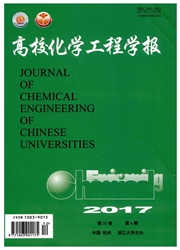

 中文摘要:
中文摘要:
在氩气环境下以丁二酸、1,4-丁二醇、尿素为原料,通过熔融缩聚、扩链反应合成新型可降解的丁二酸-丁二醇-尿素聚酯酰脲共聚物,并通过压延成膜法制得聚酯酰脲薄膜。采用傅里叶红外光谱(FT-IR)、核磁共振(1H-NMR)、凝胶色谱(GPC)、热重分析(TG)、差式扫描量热仪(DSC)、万能拉力机对聚合物及其薄膜结构及性能进行表征。结果表明:成功地合成了丁二酸-丁二醇-尿素聚酯酰脲共聚物,分子量可达7.3×104,熔点约为111.5℃,分解温度约为380℃。随着尿素含量的增加,共聚物薄膜拉伸强度增加,而断裂伸长率降低。经水解降解测试表明,引入尿素共聚改性PBS,可以提高共聚物的降解性能。
 英文摘要:
英文摘要:
A biodegradable poly(succinic acid-1,4-Butanediol- urea) polyester ureide(PEU) was synthesized via melt phase polycondensation and chain extension reaction under argon atmosphere using succinic acid, 1,4-butanediol and urea as raw materials, and related polyester ureide films were prepared through a rolling film-forming method. The structure and properties of the films were studied by infrared spectroscopy(FT-IR), nuclear magnetic resonance(H-NMR), gel permeation chromatograph(GPC), thermogravimetric analysis(TG), differential scanning calorimetry(DSC) and universal tensile machine. The results show that the poly(succinic acid-1,4-Butanediol-urea) copolymer was successfully synthesized, and the molecular weight of the copolymer can reach to 7.3?104 with melting point of -111.5℃ and decomposition temperature of -380℃.The tensile strength of the copolymer film increases with the increase of urea content, but the value of elongation at break decreases. Hydrolytic degradation tests show that introduction of urea to modify PBS can improve the degradation properties of the copolymer.
 同期刊论文项目
同期刊论文项目
 同项目期刊论文
同项目期刊论文
 期刊信息
期刊信息
